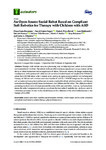An Open-Source Social Robot Based on Compliant Soft Robotics for Therapy with Children with ASD
| dc.contributor.author | Casas-Bocanegra, D | en |
| dc.contributor.author | Gomez-Vargas, D | en |
| dc.contributor.author | Pinto-Bernal, MJ | en |
| dc.contributor.author | Maldonado, J | en |
| dc.contributor.author | Munera, M | en |
| dc.contributor.author | Villa-Moreno, A | en |
| dc.contributor.author | Stoelen, MF | en |
| dc.contributor.author | Belpaeme, T | en |
| dc.contributor.author | Cifuentes, CA | en |
| dc.date.accessioned | 2021-11-05T11:31:46Z | |
| dc.date.available | 2021-11-05T11:31:46Z | |
| dc.date.issued | 2020-09-20 | en |
| dc.identifier.issn | 2076-0825 | en |
| dc.identifier.uri | http://hdl.handle.net/10026.1/18224 | |
| dc.description.abstract |
<jats:p>Therapy with robotic tools is a promising way to help improve verbal and nonverbal communication in children. The robotic tools are able to increase aspects such as eye contact and the ability to follow instructions and to empathize with others. This work presents the design methodology, development, and experimental validation of a novel social robot based on CompliAnt SofT Robotics called the CASTOR robot, which intends to be used as an open-source platform for the long-term therapy of children with autism spectrum disorder (CwASD). CASTOR integrates the concepts of soft actuators and compliant mechanisms to create a replicable robotic platform aimed at real therapy scenarios involving physical interaction between the children and the robot. The validation shows promising results in terms of robustness and the safety of the user and robot. Likewise, mechanical tests assess the robot’s response to blocking conditions for two critical modules (i.e., neck and arm) in interaction scenarios. Future works should focus on the validation of the robot’s effectiveness in the therapy of CwASD.</jats:p> | en |
| dc.format.extent | 91 - 91 | en |
| dc.language | en | en |
| dc.language.iso | en | en |
| dc.publisher | MDPI | en |
| dc.title | An Open-Source Social Robot Based on Compliant Soft Robotics for Therapy with Children with ASD | en |
| dc.type | Journal Article | |
| plymouth.issue | 3 | en |
| plymouth.volume | 9 | en |
| plymouth.journal | Actuators | en |
| dc.identifier.doi | 10.3390/act9030091 | en |
| plymouth.organisational-group | /Plymouth | |
| plymouth.organisational-group | /Plymouth/Faculty of Science and Engineering | |
| plymouth.organisational-group | /Plymouth/REF 2021 Researchers by UoA | |
| plymouth.organisational-group | /Plymouth/REF 2021 Researchers by UoA/UoA11 Computer Science and Informatics | |
| plymouth.organisational-group | /Plymouth/Research Groups | |
| plymouth.organisational-group | /Plymouth/Research Groups/Marine Institute | |
| plymouth.organisational-group | /Plymouth/Users by role | |
| dcterms.dateAccepted | 2020-09-11 | en |
| dc.rights.embargodate | 2021-11-06 | en |
| dc.identifier.eissn | 2076-0825 | en |
| dc.rights.embargoperiod | Not known | en |
| rioxxterms.versionofrecord | 10.3390/act9030091 | en |
| rioxxterms.licenseref.uri | http://www.rioxx.net/licenses/all-rights-reserved | en |
| rioxxterms.licenseref.startdate | 2020-09-20 | en |
| rioxxterms.type | Journal Article/Review | en |


